How much do graduates of different Russian universities earn
How much do graduates of different Russian universities earn
We, at My Circle, have recently been working on the profile of the education of our users, since we believe that education, both higher and additional, is a crucial component of a modern IT career.
Recently, we have added profiles of universities and institutions ext. education, which is going to statistics on their graduates, as well as the opportunity to indicate in your professional profile courses taken. Then they conducted a study on the role of education in the employment and career of IT specialists.
Further, we were curious how much graduates of different universities earn, becoming developers and having worked for 4 years or more after graduation. Today we will try to answer this question.
')

Methodological notes
In this study, we will look only at the backend, frontend, and full-stack developers. For more reliable data, we take only those from them who studied at universities, who are listed with 100 or more users of “My Circle” and for which 10 or more graduates with salaries were recruited. We also leave only those who graduated from the university no later than 2015 and had at least 4 years left to build a career. Finally, we restrict the sample to only those who have visited the service during the last year, and therefore most likely updated their profile data.
As a result, we get about 9 thousand graduates-developers from 150 Russian universities.
Education geography and graduate migration
The tenth part of the developers are prepared by the universities of St. Petersburg, the fourth part - by the universities of Moscow, almost one third are made by the universities of million-plus cities and another third by the universities of the other cities.
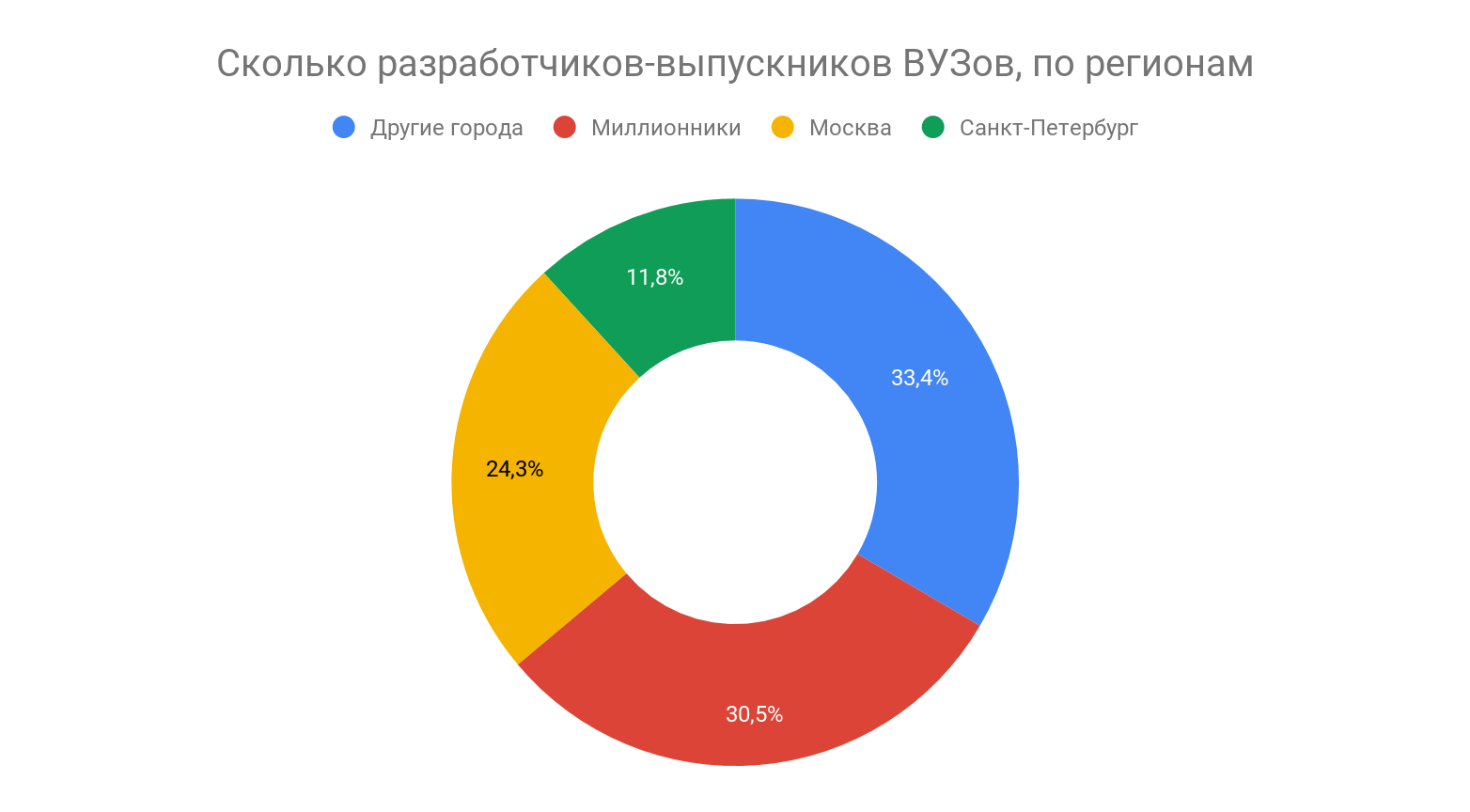
It will be correct to compare the salaries of graduates within the respective regions - after all, the size of the salary is strongly associated with the geography of work . At the same time, we know that the city of higher education will not necessarily be in the future the same as the city of work: many graduates return to their hometowns or conversely move to new places.
Having considered which of the graduates we studied, their current city differs from the city of the finished university, we got the following amazing picture. It turned out that almost every second graduate who has graduated from an ordinary city leaves it. Third - leave the city of a million, almost every fifth - the capital city.
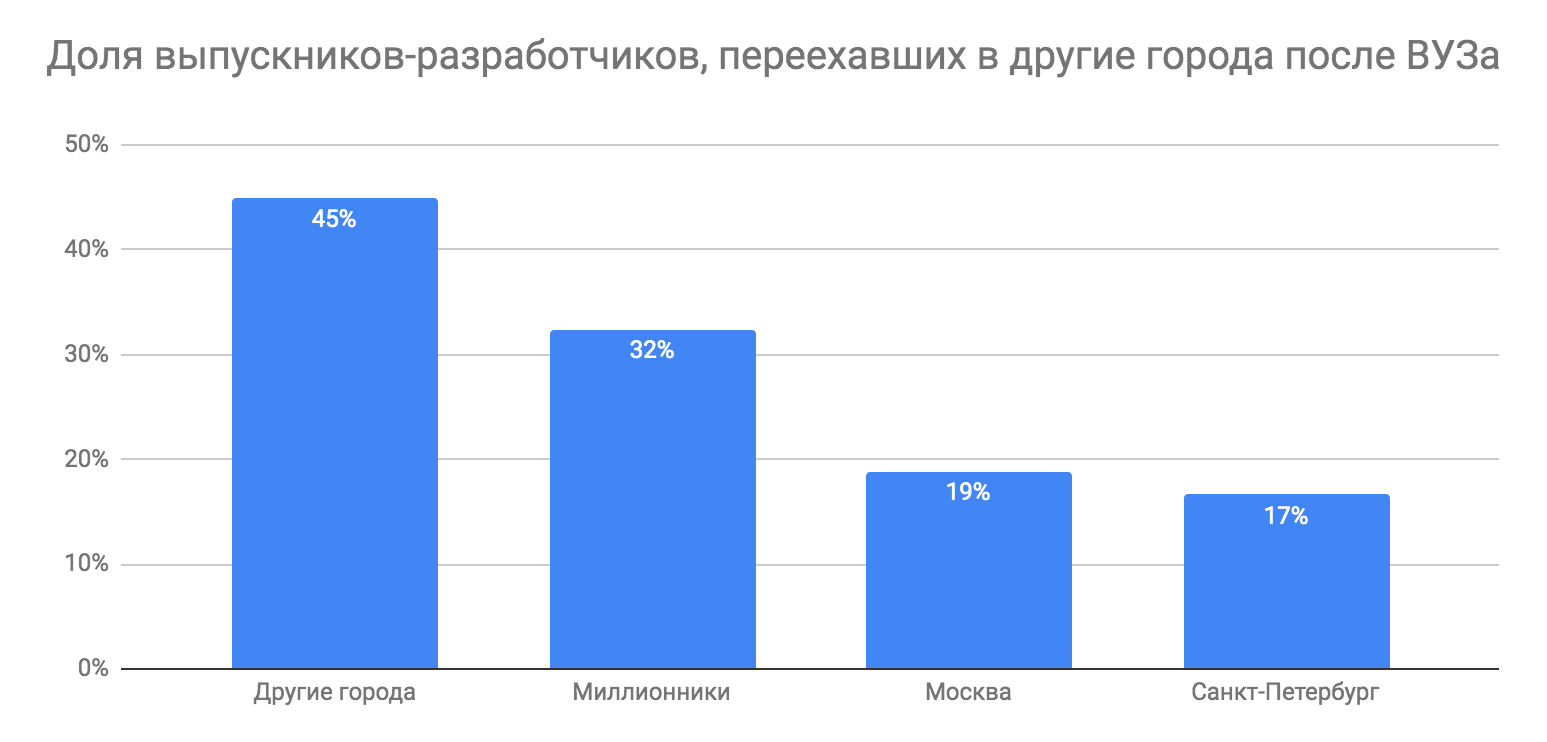
Did everyone leave the province for the capital, we were horrified? Who then remains, whence then all our cities and villages, someone else lives in them? Maybe all leave in general outside the country? Considering further, we breathed a little. After studying, they go not only to capitals, but also to millionaires, and to other cities.
Two thirds of those who leave Moscow after training, one third of those who leave St. Petersburg, and one fifth who leave million people, go to their hometowns. The largest share of those who went abroad after studying was from St. Petersburg (13%), followed by Moscow (9%).
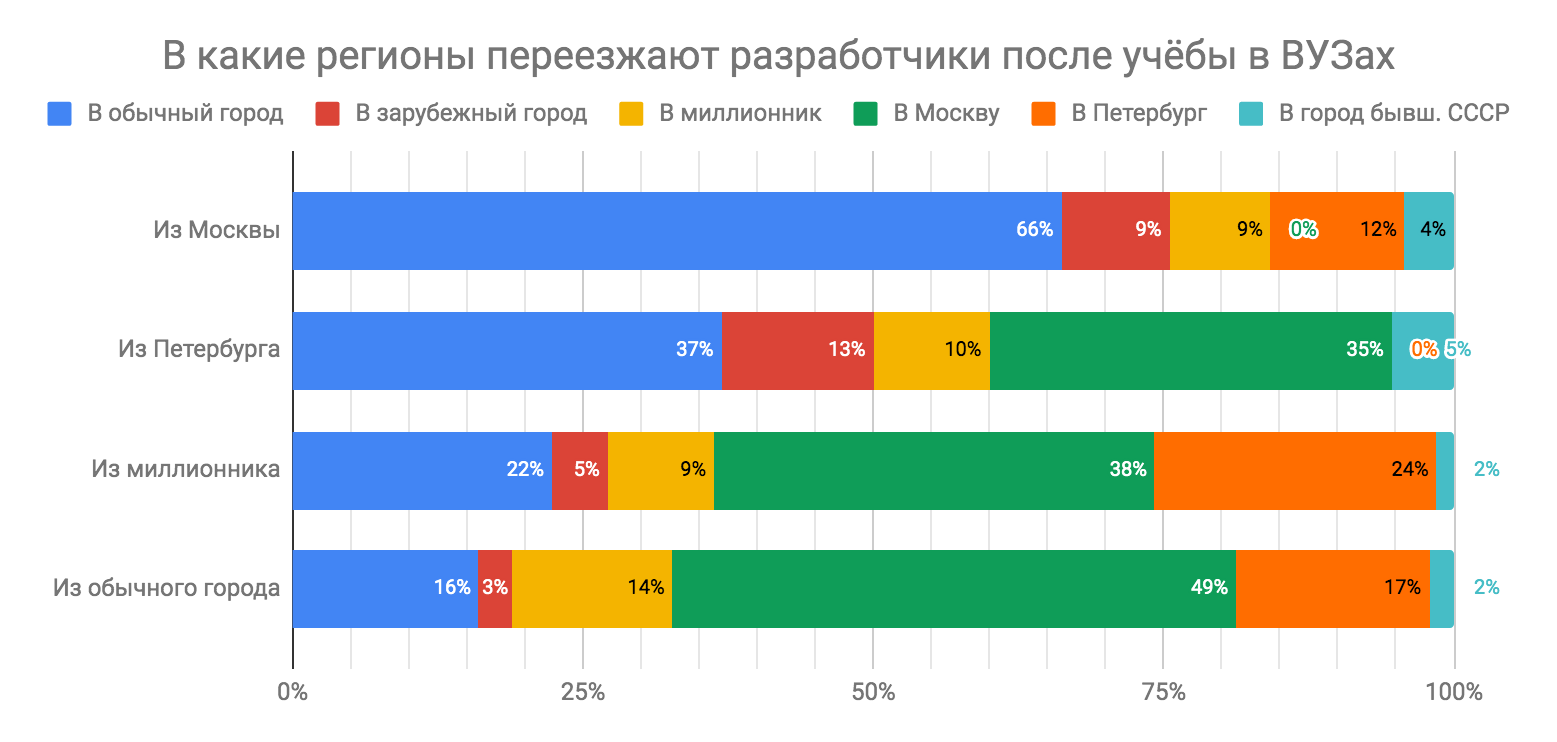
But still, we see a strong bias: Moscow and St. Petersburg are clearly drawing graduates from the rest of the regions. We see our “forge of personnel”, but the question of how this forge is being restored remains open to other studies.
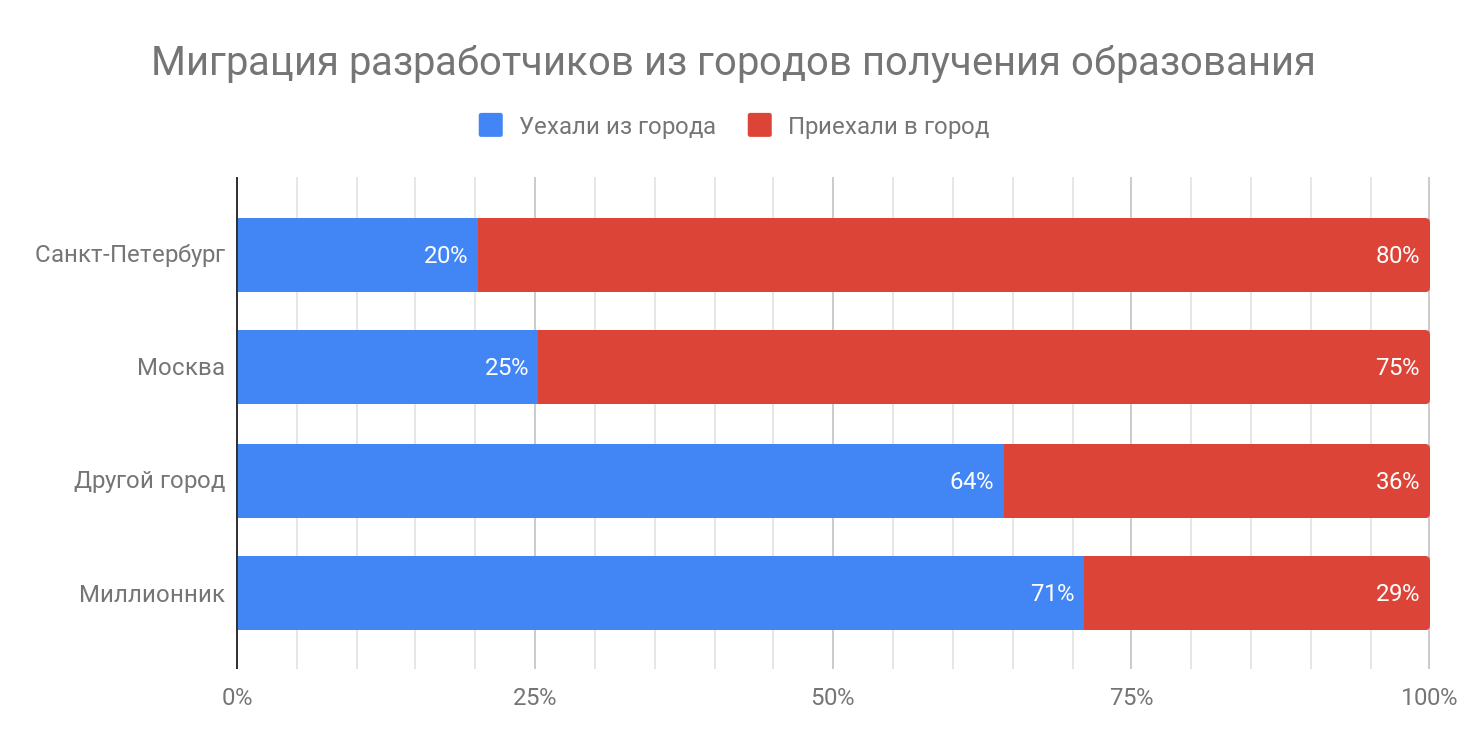
Finally, we bring the top Russian cities, where the developers leave after receiving an education, and we will proceed to the salaries.
| City moving after high school | Share moved to the city, in relation to other cities | |
| one | Moscow | 40.5% |
| 2 | St. Petersburg | 18.3% |
| 3 | Krasnodar | 3.2% |
| four | Novosibirsk | 2.0% |
| five | Yekaterinburg | 1.6% |
| 6 | Rostov-on-Don | 1.4% |
| 7 | Kazan | 1.4% |
| eight | Nizhny Novgorod | 0.8% |
| 9 | Kaliningrad | 0.8% |
| ten | Sochi | 0.7% |
| eleven | Innopolis | 0.7% |
Salaries of graduates-developers from universities in Moscow
If you do not take into account the migration of developers after graduation, then we get the following median salaries, which are now received by graduates of Moscow universities, who have become developers and have worked for 4 years or more after graduation or more.
| The name of the university | The current median graduate salary |
| MADI | 165,000 |
| MEPHI (NIIU) | 150000 |
| Moscow State University Lomonosov | 150000 |
| MTUCI | 150000 |
| RHTU them. DI. Mendeleev | 150000 |
| MIEM them. A.N. Tikhonova | 150000 |
| MEI (NRU) | 145,000 |
| MIREA | 140,000 |
| MESI | 140,000 |
| MSTU "STANKIN" | 140,000 |
| VShPiM MPU | 140,000 |
| MGIU | 135,000 |
| MGTU them. N.E. Bauman | 130000 |
| MAI (NRU) | 130000 |
| RTH (MIIT) | 130000 |
| MIEM HSE | 130000 |
| ISOT MSTU. Bauman | 122500 |
| GUU | 120,000 |
| REU them. G.V. Plekhanov | 115,000 |
| MIT | 110000 |
| RSUH | 110000 |
| MGOU | 110000 |
| HSE (HSE) | 109,000 |
| RUDN | 107500 |
| MGUTU them. K.G. Razumovsky | 105,000 |
| MGSU (NRU) | 101,000 |
| RSSU | 100,000 |
| RSU of oil and gas them. I.M. Gubkina (NRU) | 100,000 |
| University "Synergy" | 90000 |
| NUST "MISiS" | 90000 |
| MFUA | 90000 |
| RosNOU | 80,000 |
| Moscow Polytech | 70,000 |
| MPGU | 70,000 |
If you look separately - at the salaries of the developers who remained in Moscow after education, and the developers who left the city - then we see that those who left have more often earned a little less. This difference is explained by our calculations above, where we observed that the majority of those leaving Moscow go to ordinary cities, where salaries are lower than Moscow ones.
In the diagram below, we show only those universities that have accumulated 10 or more salaries for both the remaining and the graduates who left.
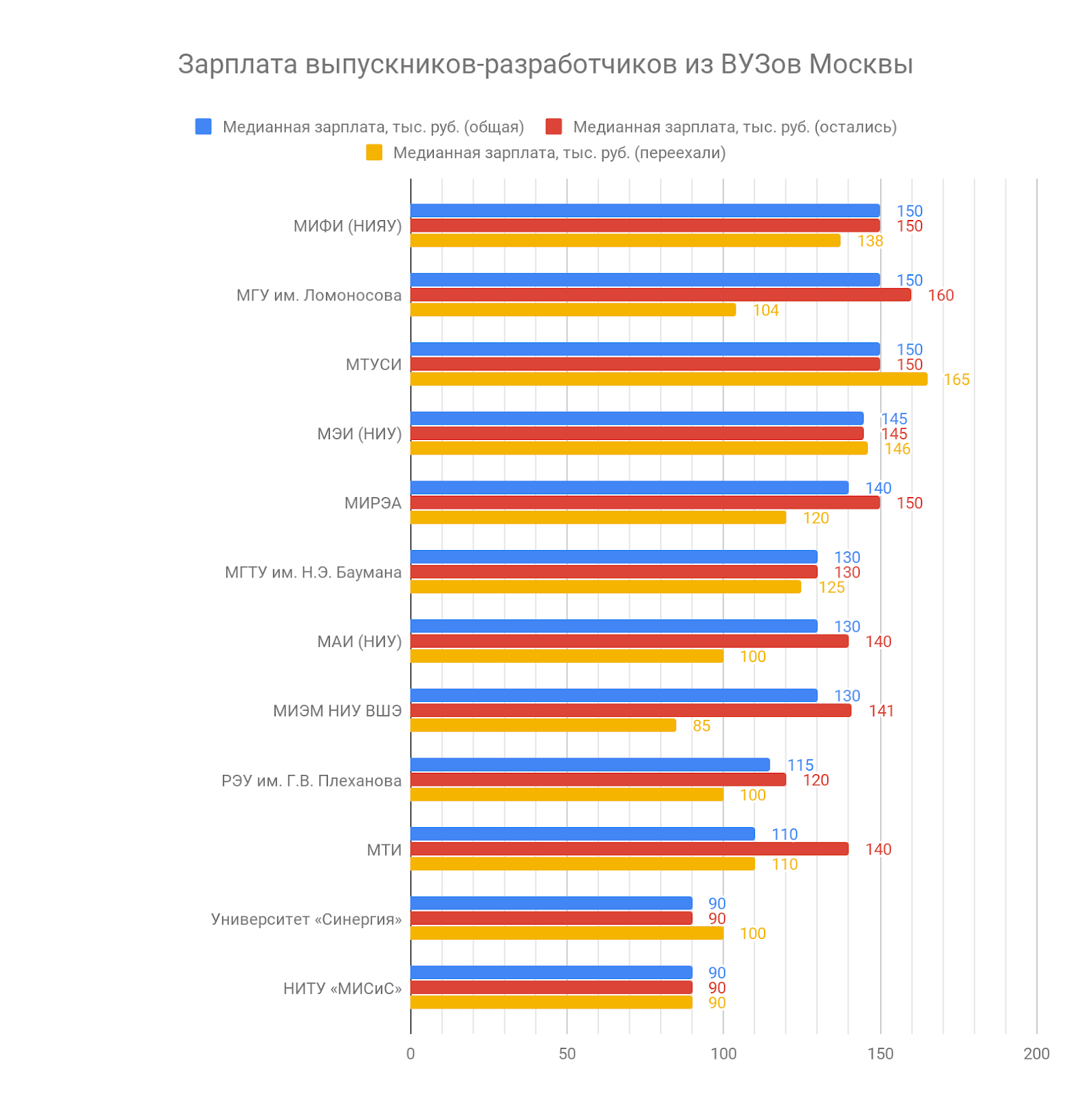
Salaries of graduates-developers from universities of St. Petersburg
Salaries of graduates from universities of St. Petersburg, who became developers and worked after graduating 4 years or more, without regard to their further migration.
| The name of the university | The current median graduate salary |
| SPbSMTU | 145,000 |
| Saint-Petersburg State Electrotechnical University "LETI" | 120,000 |
| BSTU "VOENMEH" them. Df Ustinov | 120,000 |
| SPbSU | 120,000 |
| Saint Petersburg State University of Information Technologies, Mechanics and Optics | 110000 |
| SPbPU Peter the Great | 100,000 |
| SPbGTI | 100,000 |
| ENGECON | 90000 |
| SPbSUT them. M.A. Bonch-Bruevich | 85,000 |
| SPb GUAP | 80,000 |
| RGPU them. A.I. Herzen | 80,000 |
| SPbGEU | 77500 |
| SPbSTDD | 72500 |
We will look at the salaries of graduates of St. Petersburg universities - those who remained in the city after studying and who left it. Unlike Moscow, those who have left have their salaries somewhat higher. Most likely, this is due to the fact that - as we saw above - many leave for Moscow and abroad, where salaries are higher.

Salaries of graduates-developers from universities of million-plus cities
Let's look at the salaries of graduates from universities of million-plus cities who have become developers and have worked for 4 years or more after graduation, without regard to their further migration.
| University Name (City) | The current median graduate salary |
| NSU (Novosibirsk) | 133500 |
| OmSU them. F.M. Dostoevsky (Omsk) | 130000 |
| SFU (Rostov-on-Don) | 120,000 |
| Samara University. S.P. Queen (Samara) | 120,000 |
| VSU (Voronezh) | 120,000 |
| BashGU (Ufa) | 120,000 |
| NSTU (Novosibirsk) | 120,000 |
| OmSTU (Omsk) | 120,000 |
| NSUEM (Novosibirsk) | 120,000 |
| PGUTI (Samara) | 120,000 |
| VSTU (Voronezh) | 120,000 |
| SibSAU (Krasnoyarsk) | 120,000 |
| UNN them. N.I. Lobachevsky (Nizhny Novgorod) | 110000 |
| USATU (Ufa) | 110000 |
| NSTU them. R. E. Alekseeva (Nizhny Novgorod) | 108000 |
| VolgGTU (Volgograd) | 100,000 |
| KubGAU them. I.T. Trubilina (Krasnodar) | 100,000 |
| DGTU (Rostov-on-Don) | 100,000 |
| KubSU (Krasnodar) | 100,000 |
| SUSU (Chelyabinsk) | 100,000 |
| SibSUTI (Novosibirsk) | 100,000 |
| UrFU them. B.N. Yeltsin (Yekaterinburg) | 100,000 |
| ChelSU (Chelyabinsk) | 100,000 |
| SFU (Krasnoyarsk) | 100,000 |
| Samara State Technical University (Samara) | 100,000 |
| KubGTU (Krasnodar) | 100,000 |
| KSTU (Kazan) | 100,000 |
| KNITU (Kazan) | 99,000 |
| PNRPU (Perm) | 97500 |
| KNITU-KAI them. A.N. Tupolev (Kazan) | 90000 |
| KNITU-KAI them. A.N. Tupolev (Kazan) | 90000 |
| SFU IKIT (Krasnoyarsk) | 80,000 |
| RSUU (RINH) (Rostov-on-Don) | 80,000 |
| KFU (Kazan) | 80,000 |
| VolSU (Volgograd) | 80,000 |
| NGPU (Novosibirsk) | 50,000 |
When we look at the salaries of those who left a million-plus city after education and have remained there, we see a rather serious difference in the number of patches. They sometimes left at one and a half times higher, and even often there are more salaries of graduates from Moscow universities. This is hardly due to migration abroad: as we have seen, there are no more than 5% of such people in millionaires. Most likely, such salaries can be explained by the fact that they leave the most qualified and motivated for their careers, surpassing those who sit in the place where they come

Salaries of graduates-developers from universities in other cities of Russia
Salaries of graduates from universities in ordinary cities that have become developers and have worked for 4 years or more after graduation, without regard to their further migration.
| University Name (City) | The current median graduate salary |
| Moscow State University N.P. Ogareva (Saransk) | 160,000 |
| MIET (NRU) (Zelenograd) | 150000 |
| TWU (Tver) | 150000 |
| ISEU (Ivanovo) | 150000 |
| KF MGTU them. N.E. Baumana (Kaluga) | 145,000 |
| SibGIU (Novokuznetsk) | 140,000 |
| Orel State Technical University (Orel) | 139,000 |
| UlSTU (Ulyanovsk) | 130000 |
| BSTU-Bryansk (Bryansk) | 130000 |
| SKFU (formerly North Caucasus State Technical University) (Stavropol) | 130000 |
| VlSU them. A.G. and N.G. Stoletovykh (Vladimir) | 127500 |
| MIPT (Dolgoprudny) | 126000 |
| IATE NRNU MEPI (Obninsk) | 125,000 |
| BelSU (Belgorod) | 120,000 |
| TSU (Tula) | 120,000 |
| RGRTU (Ryazan) | 120,000 |
| VOGU (formerly VSTU) (Vologda) | 120,000 |
| SevNTU (Sevastopol) | 120,000 |
| YarGU them. P.G. Demidova (Yaroslavl) | 120,000 |
| TSTU (Tambov) | 120,000 |
| IrNITU (Irkutsk) | 120,000 |
| AltSTU them. I.I. Polzunova (Barnaul) | 112500 |
| AltGU (Barnaul) | 110000 |
| KemSU (Kemerovo) | 110000 |
| SevSU (Sevastopol) | 110000 |
| RGATU (Rybinsk) | 110000 |
| TPU (Tomsk) | 110000 |
| TSU (NO) (Tomsk) | 105600 |
| FEFU (Vladivostok) | 105,000 |
| PetrSU (Petrozavodsk) | 105,000 |
| SRSPU (NPI) them. M.I. Platova (Novocherkassk) | 102500 |
| IzhSTU them. M.T. Kalashnikova (Izhevsk) | 100001 |
| SSU them. N.G. Chernyshevsky (Saratov) | 100,000 |
| PSTU "VOLGATEH" (Yoshkar-Ola) | 100,000 |
| PSU (Penza) | 100,000 |
| ChSU them. I.N. Ulyanova (Cheboksary) | 100,000 |
| TUSUR (Tomsk) | 100,000 |
| Innopolis (Innopolis) | 100,000 |
| TSU (Tyumen) | 100,000 |
| BSTU-Belgorod (Belgorod) | 100,000 |
| PNU (Khabarovsk) | 100,000 |
| OGU (Orenburg) | 100,000 |
| TTI - TF SFU (Taganrog) | 100,000 |
| SSTU them. Yu.A. Gagarin (Saratov) | 100,000 |
| UlSU (Ulyanovsk) | 100,000 |
| TPU (NO) (Tomsk) | 100,000 |
| ITA SFU (Taganrog) | 100,000 |
| TNU-Simferopol (Simferopol) | 100,000 |
| TSU (Tolyatti) | 96000 |
| UdGU (Izhevsk) | 95,000 |
| MGTU them. G.I. Nosova (Magnitogorsk) | 93000 |
| TUIT (Tashkent) | 93000 |
| ISU (Irkutsk) | 90000 |
| VyatGU (Kirov) | 90000 |
| BFU them. I. Kant (Kaliningrad) | 90000 |
| C (A) FU them. Mv Lomonosov (Arkhangelsk) | 90000 |
| PenzGTU (Penza) | 85,000 |
| SWSU (Kursk) | 80,000 |
| SSU them. P. Sorokina (Syktyvkar) | 80,000 |
| KSU (Kurgan) | 80,000 |
| ASTU (Astrakhan) | 80,000 |
When examining separately the salaries of developers who left the city of education, and remained in the city, we see about the same picture as in million-plus cities.
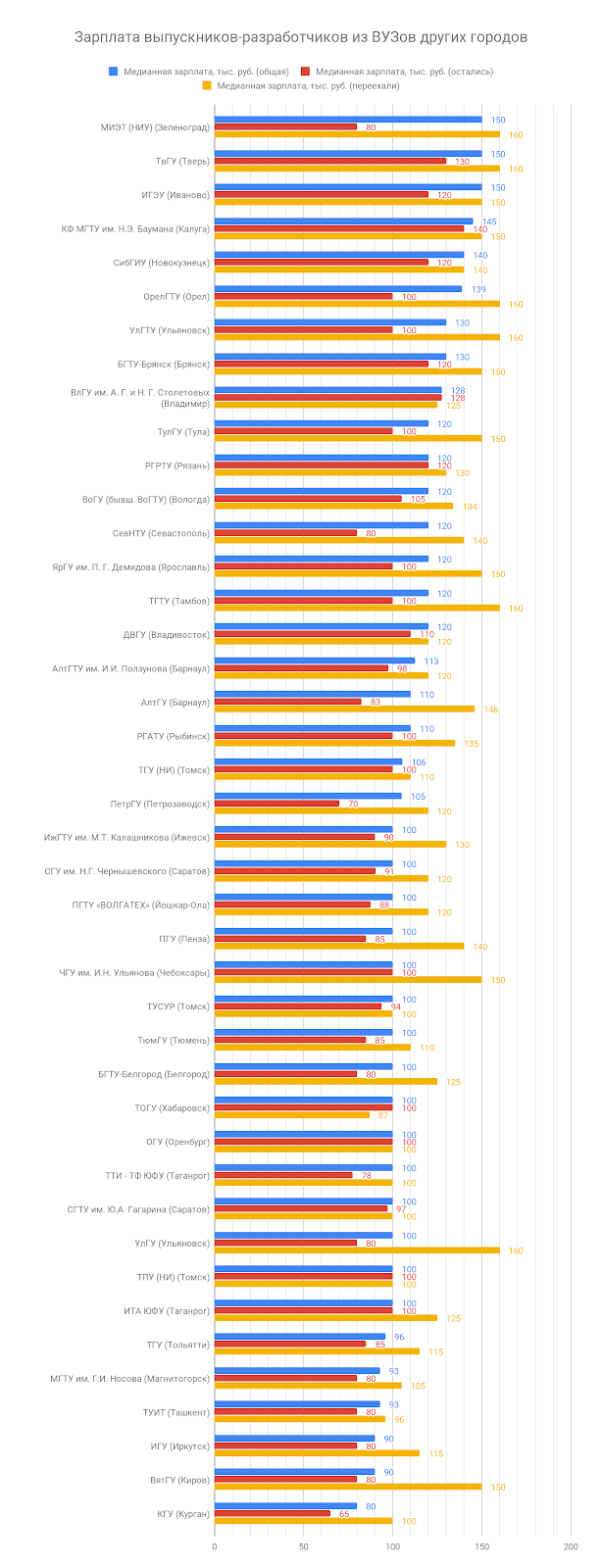
We hope you enjoyed our next study. In preparing it, we used the data of the “My Circle” salary calculator , in which we collect salaries, which IT specialists share with us. If you did not leave us your salary in this half year, please come in and share information.
By the way, we began to prepare the next semi-annual report on wages in IT. That's how it was in the past half year .
Source: https://habr.com/ru/post/457406/
All Articles